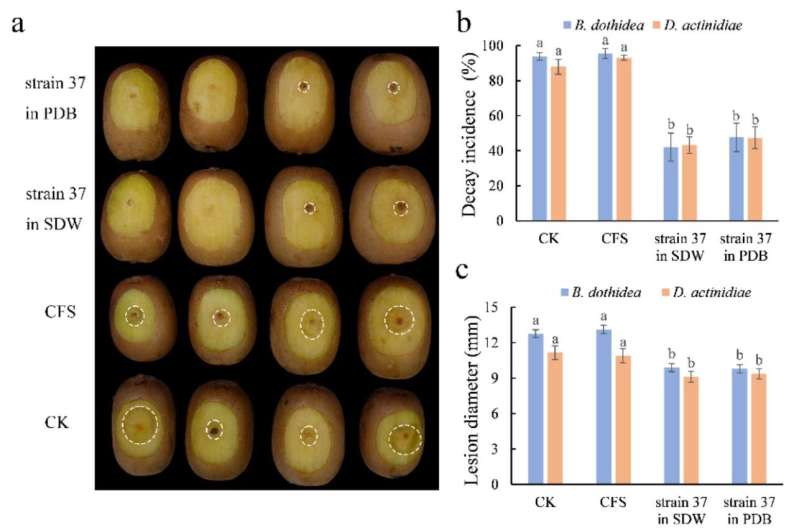This article has been reviewed according to Science X's editorial process and policies. Editors have highlighted the following attributes while ensuring the content's credibility:
fact-checked
trusted source
proofread
Using biocontrol yeast to curb kiwifruit soft rot

Postharvest kiwifruit is susceptible to various fungal pathogens, especially soft rot, causing massive industry losses. Due to scientific concerns about consumer health and the ecosystem, as well as increasing constraints on the application of chemical fungicides, extensive research has been conducted on safe and effective biocontrol agents.
Several studies have found that biocontrol yeast is efficient against blue mold, gray mold, and black rot of kiwifruit. However, there are few studies of biocontrol yeast used against kiwifruit postharvest soft rot caused by Botryosphaeria dothidea and Diaporthe actinidiae, as well as their potential mechanisms.
Researchers from the Wuhan Botanical Garden of the Chinese Academy of Sciences, together with collaborators from Huazhong Agricultural University, have screened 1,113 yeast strains and identified an antagonistic yeast, Meyerozyma guilliermondii 37, which can effectively inhibit kiwifruit soft rot, and significantly reduce natural decay in stored kiwifruit without affecting its soft-ripe quality.
According to the researchers, M. guilliermondii 37 significantly inhibited the spore germination rate of the pathogen to 28.52% and decay incidence rate to 42.11% in artificially infected kiwifruit. And the cell-free supernatant had no obvious inhibitory effect on pathogens, indicating that M. guilliermondii 37 had no direct inhibitory effect against the two pathogens.
Additionally, M. guilliermondii 37 attached tenaciously to the pathogens' mycelium and colonized rapidly in kiwifruit flesh.
Nutrients and space competition and induction of kiwifruit resistance were the primary modes of action against pathogens. Further postharvest soaking treatment of kiwifruit with biocontrol yeast significantly decreased the incidence of natural decay to 35.69% while also preserving the soft-ripe quality.
Results have been published in Microorganisms, titled "Biocontrol ability and action mechanism of Meyerozyma guilliermondii 37 on soft rot control of postharvest kiwifruit."
More information: Hui Pan et al, Biocontrol Ability and Action Mechanism of Meyerozyma guilliermondii 37 on Soft Rot Control of Postharvest Kiwifruit, Microorganisms (2022). DOI: 10.3390/microorganisms10112143
Provided by Chinese Academy of Sciences




















